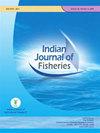Investigations on depredation by the deepsea swimming crab Charybdis smithii, during experimental gillnetting along the south-west coast of India
IF 0.3
4区 农林科学
Q4 FISHERIES
引用次数: 0
Abstract
Depredation by crabs can have a negative impact on marine gillnet fishery. Despite this fact, limited studies are attempted to evaluate depredation. The present study is the first attempt to evaluate the qualitative and quantitative effects of crab depredation on marine gillnet fishery. Experimental gillnetting was conducted onboard F V Sagar Harita from February 2017 to January 2018 along the south-west Indian coast. Depredation by the deepsea swimming crab Charybdis smithii caused intentional discard of Indian mackerel (17.59%), kawakawa (14.77%), shrimp scad (10.74%) and horse mackerel (10.02%). Financial loss due to depredation was high for Indian mackerel (19.99%), followed by shrimp scad (19.17%), kawakawa (14.77%) and horse mackerel (14.16%). A total of ₹2554.30 per operation was lost due to crab depredation. C. smithii showed a preference towards scombrids (Indian mackerel and kawakawa) over carangids (shrimp scad and horse mackerel) due to the inherent flavour and texture of scombrids. Incidence of depredation were found exclusively during June to September (monsoon season). Keywords: Crab, Depredation, Economic loss, Fishery, Marine gillnet在印度西南海岸试验刺网期间,深海游泳蟹卡雷布迪斯史密斯的掠夺调查
螃蟹的捕食会对海洋刺网渔业产生负面影响。尽管如此,有限的研究试图评估掠夺。本研究首次尝试从定性和定量的角度评价螃蟹捕食对海洋刺网渔业的影响。2017年2月至2018年1月,在印度西南海岸的F V Sagar Harita上进行了实验刺网。在深海游蟹的捕食下,印度鲭鱼(17.59%)、川川鲭鱼(14.77%)、虾scad(10.74%)和马鲭鱼(10.02%)被故意丢弃。掠夺造成的经济损失最高的是印度鲭鱼(19.99%),其次是虾(19.17%)、川河鲭鱼(14.77%)和马鲛鱼(14.16%)。由于螃蟹的掠夺,每次手术总共损失了2554.30卢比。C. smithii表现出对鲭鱼(印度鲭鱼和川川鲭鱼)的偏好,而不是carangids(虾渣和马鲭鱼),因为鲭鱼固有的味道和质地。在6月至9月(季风季节)发生掠夺事件。关键词:螃蟹,掠夺,经济损失,渔业,海洋刺网
本文章由计算机程序翻译,如有差异,请以英文原文为准。
求助全文
约1分钟内获得全文
求助全文
来源期刊

Indian Journal of Fisheries
FISHERIES-
CiteScore
0.90
自引率
20.00%
发文量
0
审稿时长
6-12 weeks
期刊介绍:
Indian Journal of Fisheries is published quarterly by the Indian Council of Agricultural Research (ICAR), New Delhi. Original contributions in the field of Fish and fisheries science are considered for publication in the Journal. The material submitted must be unpublished and not under consideration for publication elsewhere.
Papers based on research which kills or damages any species, regarded as thratened/ endangered by IUCN crieteria or is as such listed in the Red Data Book appropriate to the geographic area concerned, will not be accepted by the Journal, unless the work has clear conservation objectives.
 求助内容:
求助内容: 应助结果提醒方式:
应助结果提醒方式:


